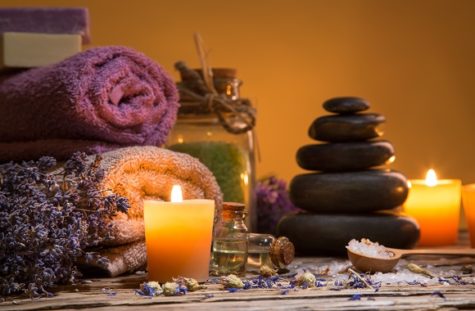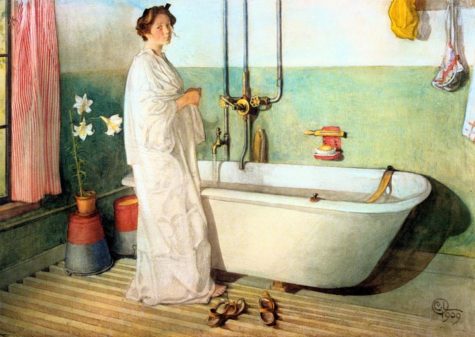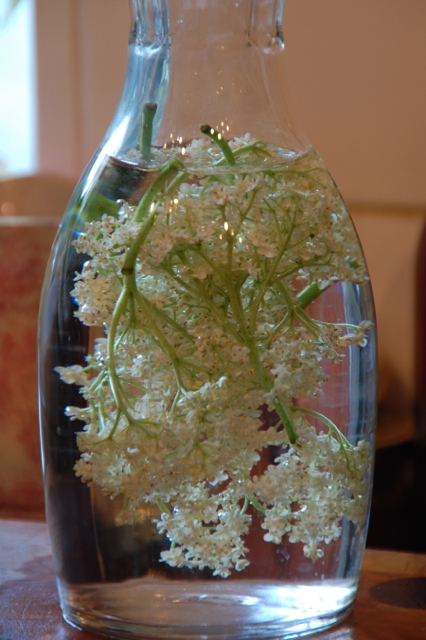Baths
Essential Oils In The Bath
Adding essential oils to your bath water is one of the best aromatherapy treatments there is, more aroma molecules are released from the oils whilst in the bath than during a massage. As you soak in the bath the hot water softens the skin which in turn speeds up oil absorption, this allows the essential oils to become more effective and potent on both the mind and body.
They are not just a simple and easy way to add a touch of luxury to your bath; they will moisten and nourish your skin, along with treating the everyday ailments that you may be suffering with.
You will also notice the aroma of the oils is so much stronger in the warm water; it’s almost like sniffing a bunch of flowers. So the next time your thinking of having a bath add a few drops of your homemade bath oil, lie back, close your eyes and enjoy.
The basic principle in making bath oils is to select essential oils for their properties and fragrance, then add them to 4 tablespoons of base carrier oil.
The easiest base oils to use in your homemade bath oils are the light base oils such as Castor Oil, Almond Oil, Jojoba Oil or even simple Sunflower Oil.
Pour your base oil into a dark or clear glass bottle or jar. If using a clear glass jar you will need to protect the oils from waning by storing the finished oils in a dark place, a bathroom cupboard is perfect for this.
Add about 20 drops of your chosen essential oils cover and shake well.
Leave the homemade bath oil to blend and mature for about 2 weeks before using.
How To Use Your Bath Oils
- Simply add 1 tablespoon of scented oil to the bath and swish around to disburse. Once in the bath use a sponge to massage the oil into the skin.
- For an extra beauty treatment whilst soaking in the bath, mixing a few elderflowers with some live yogurt will make a great little face pack that can clear the skin and help prevent wrinkles.
Bath Oil Recipes
Happiness Bath Oil
This homemade bath oil leaves you feeling warm and happy inside!
- 4 tablespoons of base carrier oil combined with:
- 10 drops Sandalwood
- 5 drops Jasmine
- 5 drops Rose
- 5 drops Bergamot
Calming and Relaxing Oil
This bath oil has a wonderfully rich and floral fragrance. A simple combination that will leave you feeling very calm and relaxed.
- 4 tablespoons of base carrier oil combined with:
- 20 drops Jasmine
- 8 drops Orange
Revitalising Oil
All of the essential oils in this recipe have been chosen to help relieve stress and depression. This uplifting oil will defiantly to put a spring back in your step.
- 4 tablespoons of base carrier oil combined with:
- 12 drops Geranium
- 6 drops Sandalwood
- 6 drops Lemon
- 2 drops Clary Sage
Relaxing Oil
Very Sweet, very fresh and very relaxing, what more can I say!
- 4 tablespoons of base carrier oil combined with:
- 12 drops Sandalwood
- 8 drops Orange
- 4 drops Rose
- 2 drops Pine
- 2 drops Lemon
Alcohol Based Bath Oil
Adding a small amount of spirits will help to distribute the oil in the bath more evenly. You will need to combine;
- 3 fl oz (100ml) Castor Oil
- 4 tablespoons vodka or brandy
- 10 drops essential oil(s) of your choice.
As with the other bath oil recipes, pour into a dark or clear glass jar or bottle (protecting the oils from daylight if using clear glass) shake well and leave to mature for 2 weeks.
Add 2 tablespoons to each bath and swish it about.
Shampoo Based Bath Oil
Baby shampoo is another very efficient carrier of oils, again helping the oils to disburse quickly and evenly in water.
- 4 fl oz (125ml) base oil (Almond Oil or Sunflower Oil
- 4 tablespoons mild baby shampoo
- 10 drops essential oil(s) of your choice
Pour the base oil into a glass bottle or jar, add the shampoo and give it a good shake.
Add the essential oil, shake again then leave to mature for 2 weeks, not forgetting to protect the oils from daylight. Add 2 tablespoons to each bath and swish it about.
Borrowed from: The Prosperity Project
10 Best Essential Oils for the Bath
Adding oils to a bath really doesn’t need to be completed, you can start by adding a single essential oil to your bath water. Essential oils normally last about 2 years if kept in a cool dark place and you literally only need a few drops so they are very cost effective.
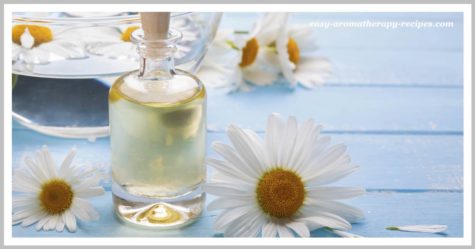
I’ve listed below those that I would recommend as the best singular all rounders that can be used and enjoyed at any time of the year.
Tips
- Before adding any oils to the bath make sure you close the bathroom door so that you can keep as much of the scent in the room as possible.
- Add the oils drop by drop and don’t be tempted to add more, working on the theory that adding twice as much will get rid of a headache quicker doesn’t work and may just end up irritating the skin.
- On average you will need about 10 drops per bath, but with some of the stronger smelling oils you will only need 5 drops. Stronger smelling oils include; eucalyptus, peppermint, bay, basil, lime, lemon, thyme, rosemary.
10 Best Essential Oils for the Bath
- Bergamot for depression – 5 drops
- Chamomile for insomnia or itchy skin – 7 drops
- Frankincense for sedative, calming and mood sweetening – 8 drops
- Geranium for relaxing yet uplifting and energizing – 10 drops
- Jasmine for apathy, stress or fatigue – 8 drops
- Lavender positive, soothing and relaxing – 10 drops
- Neroli for hypnotic with antidepressant properties – 8 drops
- Patchouli for energizing and invigorating – 5 drops
- Rose for happiness and pleasure very romantic – 10 drops
- Sandalwood for sensual and mellowing a good aphrodisiac – 8 drops
Borrowed from: The Prosperity Project
A Delicious Milk Bath
A milk bath is a bath taken in milk instead of water. Often other scents such as lavender, honey, and essential oils are added. Cleopatra, Elizabeth I of England, Elisabeth of Bavaria, and others have historically acclaimed the beautifying benefits of these baths.
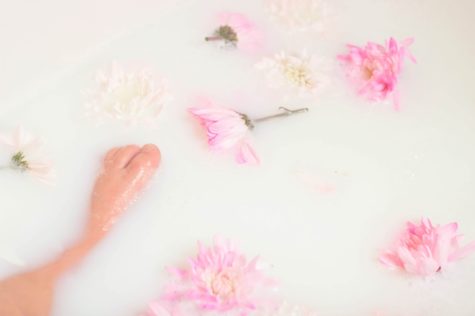
Cleopatra was definitely onto something when she indulged in daily beauty treatment milk baths. It turns out the natural lactic acid found in milk is a form of alpha-hydroxy-acid (an ingredient which can be found in some of the most expensive exfoliating products). This type of acid gently dissolves proteins to exfoliate dead skin cells, which reveal fresh, younger looking skin underneath.
The lactic acid found in milk is extremely mild, so don’t worry, it won’t strip or irritate the skin. In fact, milk is quite soothing on dry skin.
Milk is also rich in vitamins and minerals — most notably Vitamin E and zinc — which help slow the process of aging and retain skin’s natural elasticity.
Milk baths seem to be making a comeback in modern times as well. Many upscale spas in major cities offer a number of milk treatments such as hot milk and almond pedicures! That sounds divine!
But you don’t have to spend a lot of money at a fancy spa (or travel back in time) to reap the benefits of milk in your beauty routine. Milk bath recipes are some of the quickest, easiest homemade bath products you can make.
A Simple Scented Milk Bath
Here is a simple recipe that you can mix up in minutes and add your own scent to as well.
Ingredients
- 2 cups whole powdered milk
- 1/2 cup cornstarch (soothes and relieves dry, itchy skin)
- 1/2 cup baking soda (skin softener)
- Essential oil of your choice (I put in about 10 drops of lavender)
Directions
Combine the powdered milk, cornstarch and baking soda in a large glass container. Put the lid on and shake the jar until the powders are completely mixed.
Remove the cap and add the essential oil. Re-cap the jar and shake to combine. Let sit for 24 hours before using, to let the ingredients and the essential oil completely combine. Store in a cool, dark place.
To use, pour 1 to 2 cups of your milk bath under hot running water. Lie back and relax!
A couple of tips:
- This is one time when lowfat is NOT your best bet. The higher the fat content of the milk, the more nourishing it is for you skin.
- Goat’s milk and cow’s milk have higher amounts of fat which provides more conditioning, but you can also use rice, soy or coconut milk (great alternatives for vegans.)
- Also, lactose intolerant folks don’t have to worry about bathing in milk. The milk isn’t being drunk, so there won’t be any digestion problems.
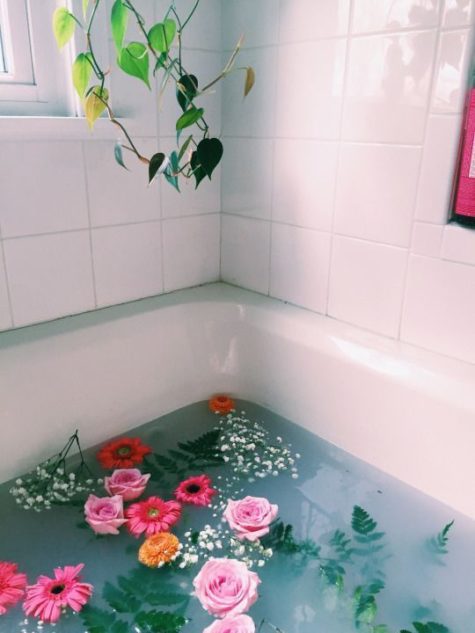
Make up your own recipe:
It’s very simple to experiment with your own recipe, all you need is powdered or fresh milk. You could even experiment with a can or two of goats milk. From this base, you can branch out and add one or more of the following:
- Honey
- Oatmeal
- Essential Oils
- Herbs – fresh or dried
- Spices – nutmeg, allspice, etc
- Flowers – fresh or dried
- Seaweed
- Sea salt
Borrowed from: The Prosperity Project
Elderflower Bath
Elder Flowers, if placed in the water used for washing the hands and face, will both whiten and soften the skin-a convenient way being to place them in a small muslin bag. Such a bag steeped in the bathwater makes a most refreshing bath and a well known French doctor has stated that he considers it a fine aid in the bath in cases of irritability of the skin and nerves.
From: A Modern Herbal
Saida: Salves To Heal Up Wounds
Brenda-Lee: Egg White Cough Cure
Pat Scott: Marsh Mallow Ointment
Sharon from Cleveland, Ohio: Egg White Cough Cure
Vagabond Witch: Soapwort Shampoo
